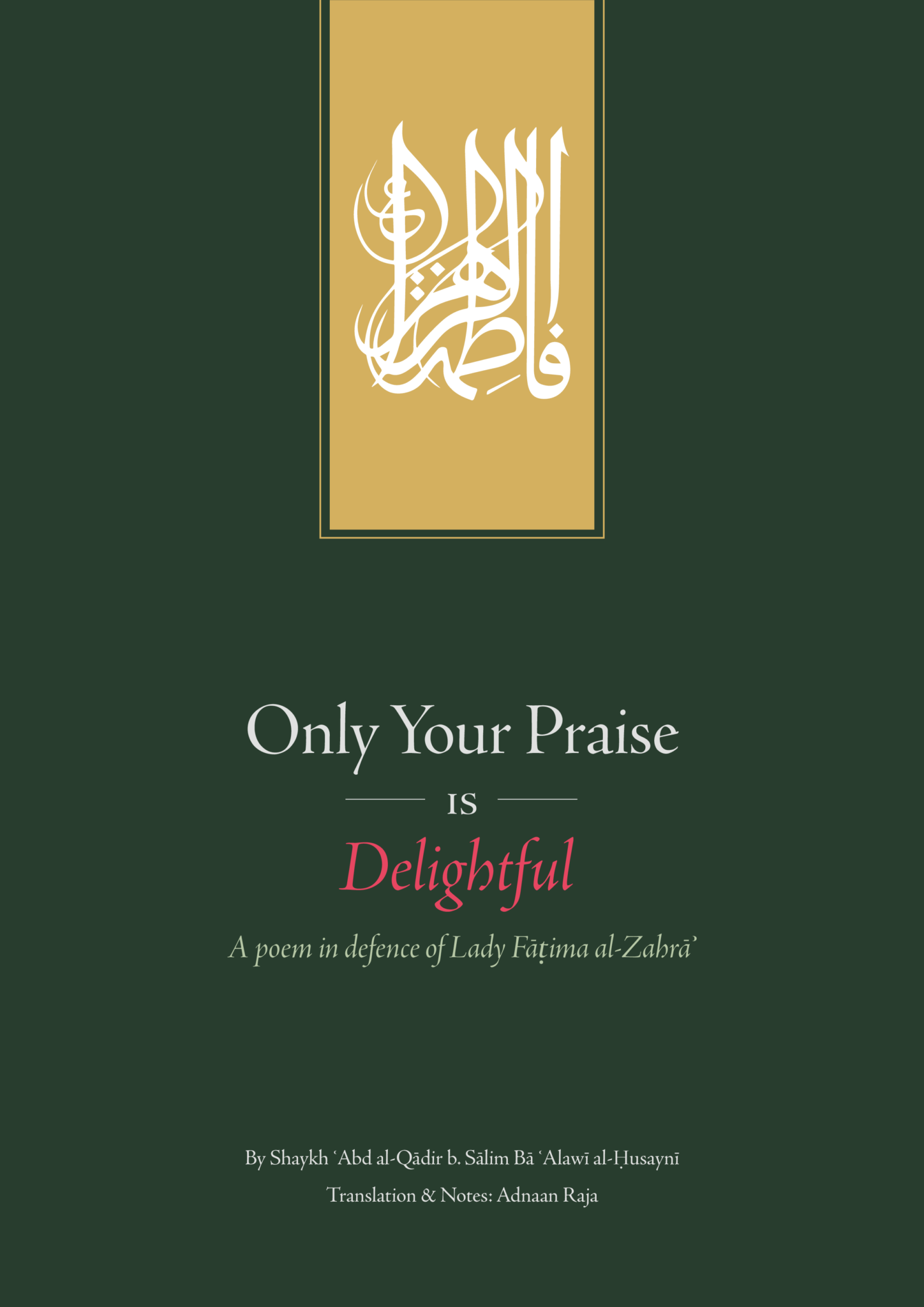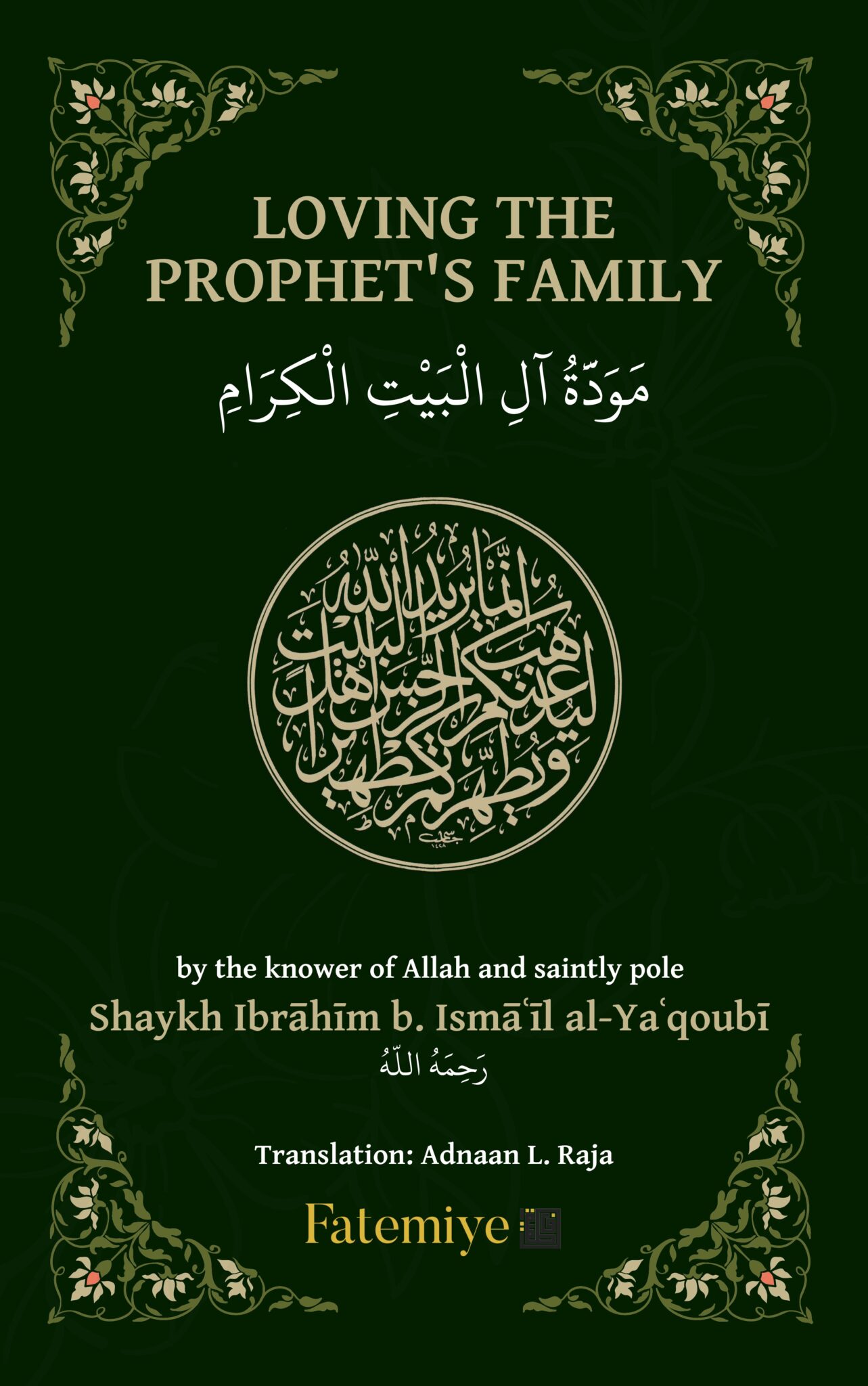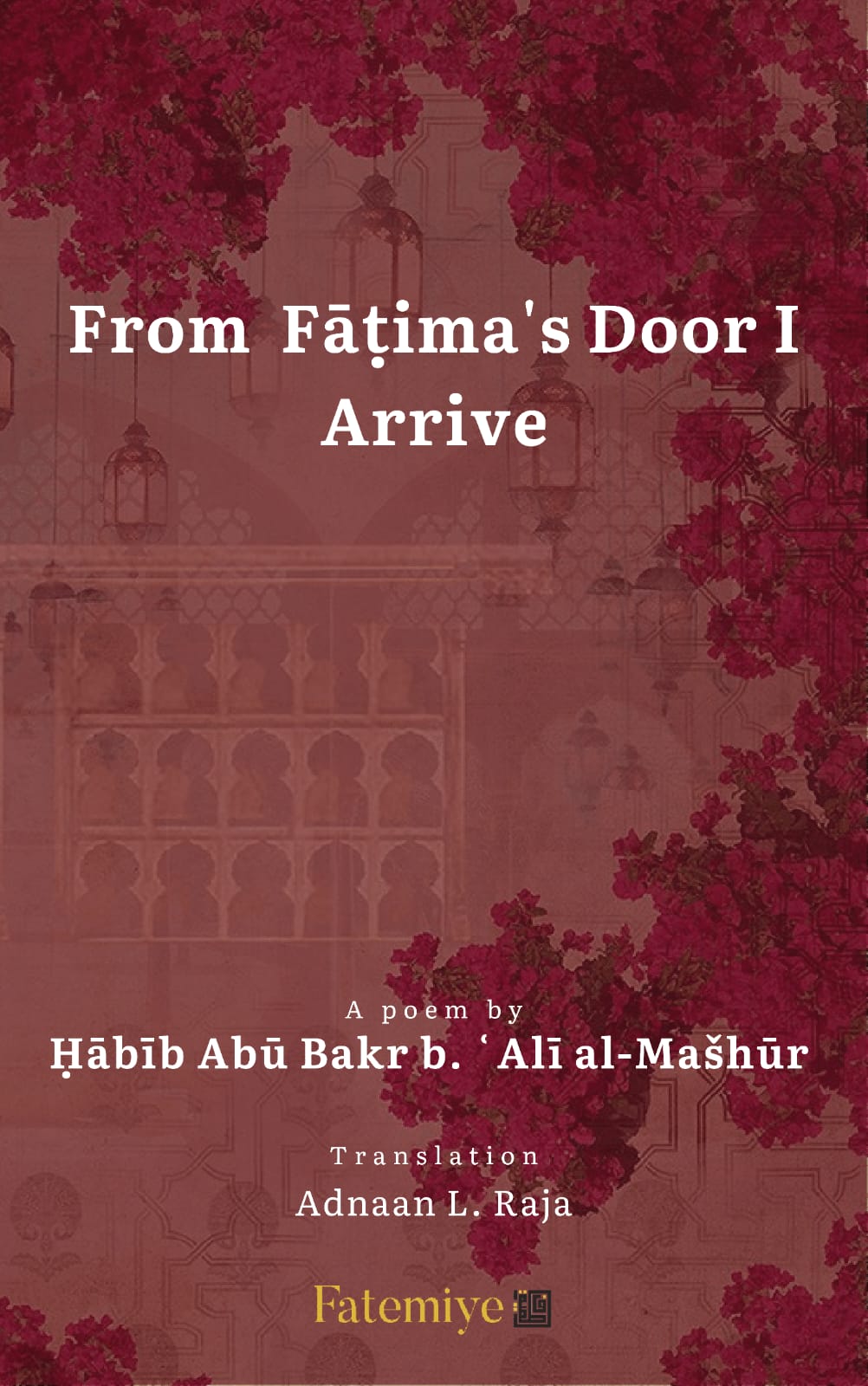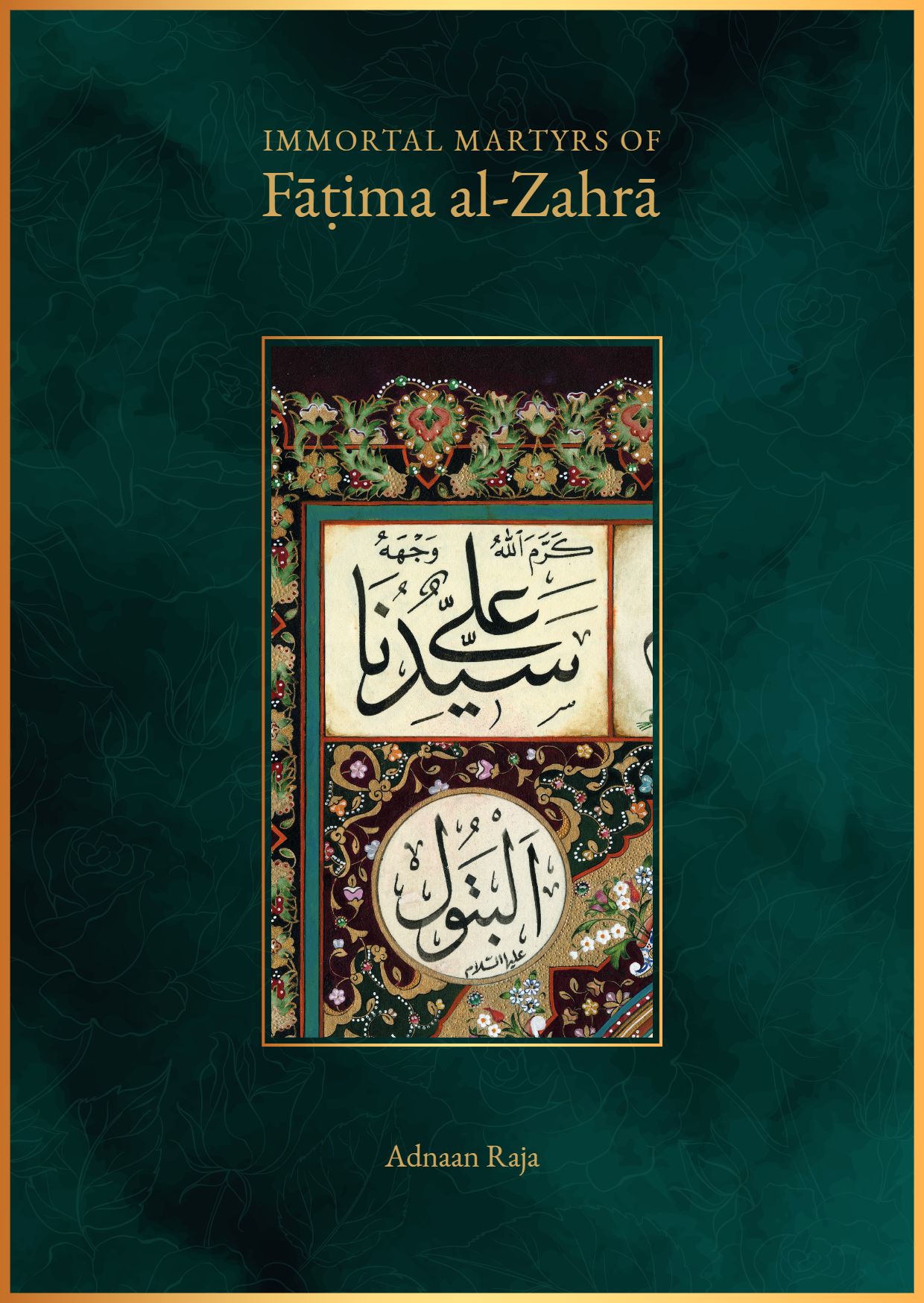لَا وَرَبِّـيْ وَحَقِّ طٰهٰ أَبِـيْكِ لَا يَطِيْبُ الْمَدِيْـحُ إِلَّا فِيْكِ
By Allah and the honour of your father ṬāHā,
Only your praise is delightful.
بَضْعَةُ الْمُصْطَفٰى وَلِلْجُزْءِ حُكْمُ الْـ كُـلِّ، يُرْضِيْهِ كُـلُّ مَا يُرْضِـيْكِ
A part of Mustafā;1 the part is akin
To the whole, so what pleases you, pleases him.2
فِلْذَةٌ مِنْهُ فِي الْمَشَاعِرِ وَالْإِحْسَاسِ يُـؤْذِيْـهِ كُـلُّ مَــا يُـؤْذِيْـكِ
A piece of him in feeling and sentiment.
So whatever upsets you, upsets him.
إِنْ بَـدَتْ مَسْحَةٌ مِنَ الْحُزْنِ يَوْمًا
فِيْ مُـحَيَّـاكِ شُوْهِدَتْ فِيْ أَبِيْكِ
If a speck of grief appeared on your countenance,
Its impact would manifest in your father.
وَحْدَةُ الـذَّاتِ لَمْ يَنَلْهَا انْفِـصَامٌ وَهْــوَ سِـرٌّ وَرَّثْتِهِ فِيْ بَنـيْكِ
You and him, united in essence—this is
The secret you bequeathed to your offspring.
أَنْتِ شِبْهُ الـنَّبِيِّ فِيْ كُـلِّ شَيْءٍ يَشْهَـدُوْنَ النَّـبِيَّ إِنْ شَاهَـدُوْكِ
A mirror of the Prophet in every way.
Whoever sees you, has seen him.
أَنْتِ رَيْحَانَةُ النَّبِيِّ إِذَا مَا شَمَّهَا سُرَّ كَيْفَ لَا يُدْنِيْكِ
The Prophet’s jasmine whose fragrance
Delighted him, so of course he drew you near.
حِيْنَمَا تُقْبِلِيْنَ يَنْهَضُ مَسْرُوْرًا وَمِـنْ بَحْرِ عَطْفِهِ يَرْوِيْكِ
Whenever you visited, he stood with joy,
Pouring unto you his sea of kindness.
رُتْبَةٌ دُوْنَهَا الْمَرَاتِـبُ فِيْ الْقُرْبِ وَفَـضْلٌ مِنَ الْإِلٰـهِ الْمَلِيْكِ
You have a station of proximity above others.
A unique virtue from the Divine King.
رُتْبَةٌ أَخْرَجَتْ ضَغَائِنَ أَقْوَامٍ فَـبَثُّـوْا الْأَحْقَادَ بِـالتَّشْكِيْكِ
A station which exposed the malice of some,
Who spread their hatred by raising doubts.
فَسَّرُوْا قَوْلَهُ الْمَوَدَّةَ فِيْ الْقُرْبىٰ بِـقُـرْبٰى الْـجَمِيْعِ لَا بِذَوِيْـكِ
They misconstrued his command: “love the near-kin”
Extending it to everyone, not your family.
وَأَحَادِيْثٌ أَنْـكَـرُوْهَا وَأُخْـرٰى ضَعَّـفُوْهَـا لِأَنَّـهَا تَـعْنِـيْكِ
They rejected or weakened many hadith,
Simply because they laud you,
حَـسَدًا مِنْـهُمُ وَجَهْلًا فَـلَوْلَا جَـهْلُهُمُ بِالْمَـقَامِ مَا حَـسَدُوْكِ
In sheer envy and utter ignorance.
They would not envy if they knew your rank.
لَوْ أَحَـبُّوْا أَبَاكِ حَـقًّا أَحَـبُّوْكِ وَيـَقْلِـيْهِ كُـلُّ مَـنْ يَـقْلِـيْكِ
If they truly loved your father, they would love you,
For only who loathes him would loathe you.
فَرِحُوْا بِالْخِلَافِ فِيْ إِرْثِ فَدَكٍ لَمْ يُرَاعُوْا الْآدَابَ إِنْ ذَكَـرُوْكِ
They rejoice over the dispute of Fadak,
Flouting all manners when mentioning you.
ثُمَّ قَالُوْا أَزْوَاجُ طٰهٰ هُمُ الْآلُ وَأَتْبَاعُـهُ وَلَـمْ يَقْدُرُوْكِ
They claim: “TaHa’s family are only his wives
And followers,” thus, undermining you.
وَحَدِيْثُ الْكِسَاءِ حِصْنٌ مَنِيْعٌ وَهْوَ سُوْرٌ مِنْ كُلِّ رِجْسٍ يَقِيْكِ
But the Cloak is a fortress guarding you;
An impenetrable shield against all blemishes.
وَحَدِيْثُ الْكِسَاءِ تَاجٌ مِنَ الْمُخْتَارِ يَزْرِيْ بِتَاجِ كُلِّ الْمُلُوْكِ
A glorious crown from the chosen Prophet,
Which eclipses the crowns of all kings.
وَدَلِيْلُ التَّطْهِيْرِ تَاجٌ مِـنَ اللهِ فَتِيْهِيْ بِفَضْلِ مَنْ تَوَّجُوْكِ
The verse of purity is a crown from Allah.
So bask in the gift of those who crowned you.
هُمْ مِنَ الرِّجْسِ طَهَّرُوْكِ وَابْنَاكِ وَهُمْ عَنْ جَهَـنَّمٍ فَطَمُوْكِ
He purged you and your sons of all taints.
And secured you against the Fire.
قَدْ قَضٰى اللهُ أَنْ يُّـتِـمَّ بِكُمْ نُوْرَ هُدَاهُ بِالرَّغْـمِ مِنْ شَانِـيْكِ
He decreed to complete His guidance’s light
Through you, despite your detractors.
أَنْتِ كَالْبَحْرِ فِيْ الْعَطَاءِ وَأَوْلَا دُكِ كَالدُرِّ مَالِئًا شَاطِئِيْكِ
You are the ocean of generosity.
Your children, pearls adorning your shore.
قَدْ دَعَا الْمُصْطَفٰى بَأَنْ يُخْرِجَ اللهُ كَثِيْرًا مِنْ نَسْلِكِ الْمَبْرُوْكِ
Muṣṭafā prayed for Allah to multiply
The number of your blessed descendants.
فَـكَأَنِّيْ بِهِ يُهَمْهِمُ يَدْعُوْ فِيْ لَيَالِي الزَّفَافِ إِذْ يَحْبُوْكِ
As if I was there when he whispered a prayer,
On your wedding night, honouring you
بِدُعَاءِ الْأَبِ الشَّفِيْقِ وَيـُوْلِيْ زَوْجَكِ الْمُرْتَضٰى بما يُوْلِيْكِ
With a loving father’s prayer and awarded
Your husband al-Murtaḍā what he awarded you.
أَنْتِ آثَرْتِهِ بِخُبْزٍ وَقَدْ جَاعَ ثَلاثًا وَلَيْسَ بِالْمَنْهُوْكِ
You offered him bread for he had not
Eaten for three days, yet he was full of vigour.
وَبِلَا خَادِمٍ صَبَرْتِ عَـلٰى الْبَيْـتِ فَبِالصَّبْرِ دَائِـمًـا يُـوْصِـيْكِ
Without a helper, you were patient in the house
For he would always prescribe patience.
وَالرَّحٰى أَثَّرَتْ بِكَفَّيْكِ لَوْ تَدْرِيْ الرَّحٰى مَـنْ تَمـَسُّهَا تَفْدِيْكِ
The millstone bruised your hands. Only if it knew
Who holds it, it would have sacrificed itself!
وَأَسَرَّ النَّبِيُّ فِيْ سَاعَةِ الْكَـرْبِ فَـأَبْكَاكِ مَـا اَّلذِيْ يُبْكِيْكِ
In that painful hour, the Prophet whispered to you
Making you cry—which news made you weep?
قَدْ أَلِفْتِ الْحَيَاةَ بِالْقُرْبِ مِـنْهُ فَتَأثَّرْتِ بِالْفِرَاقِ الْوَشِـيْكِ
Spending life in his proximity,
News of separation deeply struck you.
ثُـمَّ أَدْنَـاكِ ثَانِـيًا فَـتَبَسَّمَـتِ فَهَذَا أَبُوْكِ يَسْتَـرْضِيْكِ
Then, he whispered again, your smile beamed!
This is your father, seeking to please you,
بِاللِّحَاقِ السَّرِيْـعِ بَعْدَ شُهُوْرٍ كُلُّ شِيْءٍ يَهُـوْنُ بَعْدَ أَبِيْكِ
By promising to meet again in a few months,
For besides him, nothing matters to you.
تِلْكَ وَاللهِ رُتْبَةٌ وَمَقَامٌ لَا يُسَامٰى سُبْحَانَـهُ مُعْطِيْـكِ
By Allah, your rank and status are unmatched.
Glory be to the Divine who exalted you.
فَهَنِيْئًا أُمَّ الْحُسَيْنِ هَنِيْئًا وَحَـنَانًا أُمَّاهُ أَنَّا بَنُوْكِ
Congratulations to you, mother of Ḥusayn.
Dear mother, we too are your children.
أَوَ تُنْسِيْكِ جَنَّةُ الْخُلْدِ أَوْلَادَكِ حَاشَا وَإِنْ هُمُ قَدْ نَسُوْكِ
Will Paradise make you forget your children?
Never! Even if they forget you.
فَاسْأَلِي اللهَ أَنْ يـَّمُنَّ عَـلَـيْنَا بِالرِّضٰى فِيِ السُّكُوْنِ وَالتَّحْرِيْكِ
So ask Allah to bless us with His pleasure
In all our movements and stillness.
وَاذْكُرِيْنَا عَنْدَ النَّبِيِّ فِإنَّا قَدْ بَعُدْنَا عَنْ سَيْرهِ وَالسُّلُوْكِ
Mention us to the Prophet, for we have
Strayed from his teachings and way.
وْاذْكُرِيْنَا أُمَّاهُ فِيْ مَوْقِفِ الْحَشْرِ وَنَادِيْ بَنِيْكِ فَلْيَتْبَعُوْكِ
Mother, remember us in Resurrection’s plains
Calling your children, for they will follow you.
أَنْقِذِيْنَا مِنَ الزِّحامِ وَأَهْوَالٍ عِظَامٍ فاللهُ لَا يـُخْزِيْكِ
Save us from the throngs and great ordeals.
For Allah will never dishearten you.
وَلَنَا فَيْ الْإِلٰهِ ظَنٌّ جَمِيْلٌ مِنْهُ وَعْدٌ فِيْ «هَلْ أَتٰى» يُنْبِيْكِ
We hold a good opinion of Allah.
His promise “Is there not” exonerates you,
قَدْ وَقَاكِ شُرُوْرَ يَوْمٍ عَبُوْسٍ وَسُرُوْرًا وَنَضْرَةً يَجْـزِيْكِ
Protecting you against the dreads of that Day,
Rewarding you with joy and vitality.
وَلَكُمْ يُعْقَدُ اللِّوَاءُ وِفِيْ ظِلٍّ ظَلِيْلٍ إِلٰهُنَا يـُؤْوِيْـكِ
The banner will be raised for you
And in the shade, Our Lord will shelter you.
فَإِذَا رَفْرَفَ اللِّوَاءُ عَلَيْكُمْ فَاذْكُرِيْنَا لَعَلَّنَا نَأْتِيْكِ
When that banner flutters above you
Beckon us—hopefully, we will race to you.
واذْكُرِيْنَا إِذَا وَرَدتِّ عَلٰى الْحَوْضِ لِنُسْقٰى بِكَفِّ مَنْ يـَسْقِيْكِ
Call us as you approach the Pool, so we may,
Quaff from the same hand which quenches you
فَعَسٰى اللهُ أَنْ يَمُنَّ بِرُؤْيَاكِ وَفِيْنَا مَا تَرتَضِيْنَ يُرِيْكِ
Perhaps Allah will permit us to see you,
And show you in us what pleases you.
وَسَلَامٌ عَلَيْكِ فِيْ كُلِّ حِيْنٍ فَهْوَ يَغْشَاكِ مِنْ لَدُنْ بَارِيْكِ
Peace be upon you in every passing moment.
May peace from Your Creator envelop you,
مَا هَمٰى مَاطِرٌ وَمَا قَالَ حَادٍ لَا يَطِيْبُ الْمَدِيْحُ إِلَّا فِيْكِ
For as long as rain falls, and a shepherd cries:
“Only your praise is delightful.”
Notes
1 Allah’s Messenger r declared, “Fāṭima is a part of my flesh (baḍʿa). Whoever angers her, angers me.” (Ṣaḥīḥ al-Bukhārī: 3714).
2 Allah’s Messenger r said, “Fāṭima is a branch of my (shujna). I am pleased by whatever pleases her.” (Tārikh Dimashq, 37: 387, Beirut: Dar Al Kotob Al Ilmiyah, 2012).
3 A variant of the above hadith states, “Fāṭima is a part of my flesh. I am upset by whatever upsets her and hurt by whatever hurts her.” (Ṣaḥīḥ al-Bukhārī: 5230).
4 The mother of the believers, Lady ʿĀʾisha explained, “I did not find anyone more like the Messenger of Allah r in behaviour, calm deportment, disposition, and discourse than Fāṭima—may Allah honour her face.” (Sunan Abī Dāwūd: 5217). She mirrored the Prophet’s physical appearance, walked like him, spoke in the same manner as him, and embodied the rich Muhammadan character in the truest sense.
5 “When she (Fāṭima) would visit him r, he would stand for her, take her by the hand, kiss her, and then seat her in his place. When he would visit her, she would stand for him, take him by the hand, kiss him, and then seat him in her place.” (Ibid).
6 “Allah only intends to keep evil away from you and purify you completely, dear members of the ˹Prophet’s˺ Family.” (Qurʾān, 33:33).
7 She was 18 years old when she married ʿAlī.
8 Anas reports, “Fāṭima gave bread to the Allah’s Messenger r. I said to her, ‘This is your father’s first meal in three days.’” (Musnad Aḥmad: 13223).
9 ʿAlī b. Abī Ṭālib relates, “Fāṭima came to the Prophet r asking for a servant. He said, ‘May I inform you of something better than that? When you retire to bed, recite subḥān Allah thirty-three times, al-ḥamdu lillāh thirty-three times, and allāhu akbar thirty-four times.’”
10 During the Prophet’s final illness, before his demise.
11 For 18 years, she shadowed the Prophet r, immersed in the sea of Muhammadan secrets, absorbing his character, knowledge, and wisdom. For example, she was the only daughter to go with him into a military expedition. When the Messenger of Allah r was wounded in the Expedition of Uhud, “Fāṭima—peace be upon her—the daughter of Allah’s Messenger r would wash the wound while ʿAlī poured water ˹over it˺ using a shield. When Fāṭima saw the water worsening the bleeding, she took a piece of a palm mat, burnt it, and rubbed ˹the ashes˺ into ˹the wound˺, whereupon the bleeding stopped.” (Ṣaḥīḥ al-Bukhārī: 3847). After marriage, she lived next door to the Prophet r and continued to bask in his exceptional care and attention and regularly consult him. He would wake her and her husband for Tahajjud (ibid: 1127); ensure she was the last person he bade farewell when leaving for a journey and the first he met upon returning (Mustadrak al-Ḥākim: 4790); and remained by her side as a cherishing father, advisor, and guide. Once, “When Allah’s Messenger ﷺ visited her, he found her wearing a ˹coarse˺ wool dress. She was working the hand mill while feeding her son, her eyes filled with tears. The Prophet r consoled her, ‘My daughter, you are accepting the bitterness of this world in exchange for the sweetness of the Hereafter.’ Then he recited, ‘Soon, your Lord will give you [so much] that you will be pleased (Qurʾān, 93:5).’” (al-Baḥr al-Madīd, 7: 318, Beirut: Dar Al Kotob Al Ilmiyah, 1423/2002).
12 Reference to the hadith of Lady ʿĀʾisha: “Once Fāṭima, visited, her walk resembling the walk of the Prophet r. The Prophet r greeted her, ‘Welcome my daughter!’ Seating her to his right or left, he whispered ˹a secret˺ to her, making her weep. He then whispered again, making her laugh. I said ˹to myself˺, ‘I never saw happiness so near to sadness as I saw today.’ ˹Later˺, I asked her what the Prophet r had told her, but she replied, ‘I will not disclose the secret of Allah’s Messenger.’ When the Prophet r passed away, I enquired again, and she explained, ‘The Prophet r said, “Every year, Jibrīl would revise the Qurʾān with me once, but this year he has done so twice. I believe this portends my death, but you will be the first of my family to join me.” So, I started weeping. Then he said, “Will you not be pleased by being the leader of the women of Paradise (or the leader of the believing women)?” I laughed because of that.’” (Ṣaḥīḥ al-Bukhārī: 3623).
13 Lady Fāṭima passed away aged 27 years, in 11 AH, a mere six months after the demise of the Prophet r. She was the first of his family to pass away after him and unite with him in the Hereafter, thus fulfilling his promise, “You will be the first of my family to join me.”
14 Greif penetrated the core of her heart when her father, our master Muhammad r, left this world. Anas relates, “When the ˹final˺ ailment of the Prophet r worsened, he fainted, whereupon Fāṭima—peace be upon her—cried, ‘How distressed my father is! He said, ‘Your father will have no more distress after today.’ When he passed away, she cried, ‘Dear father, who has answered the call of the Lord who has invited him! Dear Father, whose dwelling place is the Highest Paradise (al-firdaws)! Dear Father! We convey this news ˹of your passing˺ to Jibrīl.’ When he was buried, Fāṭima remarked, ‘Anas, are you all pleased to put soil on Allah’s Messengerr?’” (Ṣaḥīḥ al-Bukhārī: 4462). She cried so much that ʿAlī constructed a private dwelling in the Baqīʿ cemetery for her to weep in. It is listed as the “House of Sorrow” (bayt al-ḥuzn) and Masjid Fāṭima. The structure no longer exists but its description and location have been preserved in several travelogues. See the article, “House of Sorrow: A Forgotten Relic of Lady Fāṭima” on the Fatemiye website.
15 She is the most superior woman to ever grace the world.
16 They will follow you through the crowds until they reach the Messenger of Allah r, for Lady Fāṭima will enjoy a unique standing on the Day of Reckoning, next to the Prophet r, as he r promised her one night: “Verily I, you, these two (Ḥasan and Ḥusayn), and this sleeping one (ʿAlī) will be ˹together˺ in one place on the Day of Judgment.” (Musnad Aḥmad: 794).
17 A reference to Surah al-Insān which begins with the verse, “Is there not a period of time when each human is nothing yet worth mentioning?” (Qurʾān, 76:1). According to an opinion, verses 7-9 were revealed about Lady Fāṭima, ʿAlī, Ḥasan, and Ḥusayn: “They fulfil their pledges, and fear a day the evil of which is widespread. Out of love for Allah, they feed the needy, the orphan, and the captive. They say to them, ‘We feed you, only for the sake of Allah—we do not seek any reward or thanks from you.’” This view is based on the following incident: When Ḥasan and Ḥusayn fell ill, the Prophet r and a group of Companions visited them. They advised ʿAlī to make a vow to fast if his children recover. ʿAlī, Fāṭima, and their maid, Fiḍḍa made the vow, and when both children recovered, all five began the vowed fasts. ʿAlī purchased three amounts of barley on credit from a Jewish man which Fāṭima ground into flour. ˹On the first day˺, she baked five ˹small˺ loaves, one for each of them. As they sat to break the fast, someone came to the door. “I am a pauper from the poor Muslims. Feed me; may Allah feed you from the spreads of Paradise.” They at once gave the loaves to him and broke their fasts with nothing but water. The second day, they were about to break their fast when an orphan came to the door. They readily gave him all the loaves they had prepared. This happened again on the third day when a recently released prisoner came asking for food. Although al-Ḥakīm al-Tirmidhī contested the authenticity of this report, claiming that it cannot be true since ʿAlī would not violate the fundamental duty in Islam of care towards one’s wife and children by keeping them hungry for the sake of feeding a beggar, Ibn ʿAjība explains, “This ˹incident˺ is from the sphere of spiritual states. In terms of altruism, the Companions had an exclusive state of faith due to their unwavering belief (yaqīn). For example, Abū Bakr al-Ṣiddīq donated all his wealth ˹for Allah’s sake˺ on several occasions, remarking, ‘Allah and His Messenger suffice my family…’ People of such spiritual states are excused, although the behaviour stemming from their particular state is not to be imitated. Therefore, al-Ḥakīm al-Tirmidhī’s criticism is incorrect.” (al-Baḥr al-Madīd, 7: 198). For a comprehensive evaluation of the report, see my monograph, Izālat al-Awhām ʿan Khabar Āyat al-Iṭʿām.
18 Pool of Kawthar.
19 For a comprehensive discussion on the permissibility of adding benedictions such as ʿalayha al-salām to the names of Ahl al-Bayt, refer to my book Ḥall al-Iśkāl fī al-Taslīm ʿalā al-Āl, available in the Arabic section of the Fatemiye website.




